- Home
- Roald Dahl
War Page 7
War Read online
Page 7
‘You must not tell them, Mdisho,’ I said.
‘But why not?’ he cried. ‘Have I done something wrong?’
‘Quite the opposite,’ I lied.
‘Then why must I not tell my people?’ he asked again.
I tried to explain to him how the authorities would react if they found him out. It simply wasn’t done to go round chopping heads off civilians, even in wartime. It could mean prison, I told him, or even worse than that.
He couldn’t believe me. He was absolutely shattered.
‘I myself am tremendously proud of you,’ I said, trying to make him feel better. ‘To me you are a great hero.’
‘But only to you, bwana?’
‘No, Mdisho. I think you would be a hero to most of the British people here if they knew what you had done. But that doesn’t help. It is the police who would go after you.’
‘The police!’ he cried in horror. If there was one thing in Dar es Salaam that every local was terrified of, it was the police. The police constables were all blacks, acting under a couple of white officers at the top, and they were not famous for being gentle with prisoners.
‘Yes,’ I said, ‘the police.’ I felt pretty sure they would charge Mdisho with murder if they caught him.
‘If it is the police, then I will keep quiet, bwana,’ he said, and all of a sudden he looked so downcast and disillusioned and defeated that I couldn’t bear it. I got up from the chair and crossed the room and took the scabbard of the sword down from the wall. ‘I shall be leaving you very soon,’ I said. ‘I have decided to join the war as a flier of aeroplanes.’ The only word for aeroplane in the Swahili language is ndegi, which means bird, and it always sounded good and descriptive in a sentence. ‘I am going to fly birds,’ I said. ‘I shall fly English birds against the birds of the Germani.’
‘Wonderful!’ Mdisho cried, brightening again suddenly at the mention of war. ‘I will come with you, bwana.’
‘Sadly, that will be impossible,’ I said. ‘In the beginning I shall be nothing but a very humble bird-soldier of the lowest rank, like your most junior askaris here, and I shall be living in barracks. There would be no question of me being allowed to have somebody to help me. I shall have to do everything for myself, including the washing and ironing of my shirts.’
‘That would be absolutely impossible, bwana,’ Mdisho said. He was genuinely shocked.
‘I shall manage quite well,’ I told him.
‘But do you know how to iron a shirt, bwana?’
‘No,’ I said. ‘You must teach me that secret before I go.’
‘Will it be very dangerous, bwana, where you are going, and do those Germani birds have many guns?’
‘It might be dangerous,’ I said, ‘but the first six months will be nothing but fun. It takes six months for them to teach you how to fly a bird.’
‘Where will you go?’ he asked.
‘First to Nairobi,’ I answered. ‘They will start us on very small birds in Nairobi, and then we will go somewhere else to fly the big ones. We shall be travelling a great deal with very little luggage. That is why I shall have to leave this sword behind. It would be impossible to carry a great big thing like this with me wherever I go. So I am giving it to you.’
‘To me!’ he cried. ‘Oh no, bwana, you mustn’t do that! You will need it where you are going!’
‘Not in a bird,’ I said. ‘There is no room to swing a sword when you are sitting in one of those.’ I handed him the beautiful curved silver scabbard. ‘You have earned it,’ I said. ‘Now go away and wash the blade very well indeed. Make sure there is no trace of blood left on it anywhere. Then wipe it with oil and return it to its glove. Tomorrow I shall hand you a chit saying that I have given it to you. The chit is important.’
He stood there holding the sword in one hand and the scabbard in the other, staring at them with eyes as bright as two stars.
‘I am presenting it to you for bravery,’ I said. ‘But you must not tell that to anybody. Tell them simply that I gave it to you as a going-away present.’
‘Yes, bwana,’ he said. ‘That is what I shall tell them.’ He paused for a moment and looked me straight in the eye. ‘Tell me truthfully, bwana,’ he said, ‘are you really and truly glad that I killed the big Germani sisal-grower?’
‘We killed one today as well,’ I said.
‘You did?’ Mdisho cried. ‘You killed one, too?’
‘We had to do it or he would probably have killed me.’
‘Then we are equal, bwana,’ he said, smiling with his wonderful white teeth. ‘That makes us exactly equal, you and me.’
‘Yes,’ I said. ‘I suppose it does.’
Flying Training
In November 1939, when the war was two months old, I told the Shell Company that I wanted to join up and help in the fight against Bwana Hitler, and they released me with their blessing. In a wonderfully magnanimous gesture, they told me that they would continue to pay my salary into the bank wherever I might happen to be in the world and for as long as the war lasted and I remained alive. I thanked them very much indeed and got into my ancient little Ford Prefect and set off on the 600-mile journey from Dar es Salaam to Nairobi to enlist in the RAF.
When one is quite alone on a lengthy and slightly hazardous journey like this, every sensation of pleasure and fear is enormously intensified, and several incidents from that strange two-day safari up through central Africa in my little black Ford have remained clear in my memory.
A frequent and always wonderful sight was the astonishing number of giraffe that I passed on the first day. They were usually in groups of three or four, often with a baby alongside, and they never ceased to enthral me. They were surprisingly tame. I would see them ahead of me nibbling green leaves from the tops of acacia trees by the side of the road, and whenever I came upon them I would stop the car and get out and walk slowly towards them, shouting inane but cheery greetings up into the sky where their small heads were waving about on their long long necks. I often amazed myself by the way I behaved when I was certain that there were no other human beings within fifty miles. All my inhibitions would disappear and I would shout, ‘Hello, giraffes! Hello! Hello! Hello! How are you today?’ And the giraffes would incline their heads very slightly and stare down at me with languorous demure expressions, but they never ran away. I found it exhilarating to be able to walk freely among such huge graceful wild creatures and talk to them as I wished.
The road northwards through Tanganyika was narrow and often deeply rutted, and once I saw a very large thick greenish-brown cobra gliding slowly over the ruts in the road about thirty yards ahead of me. It was seven or eight feet long and was holding its flat spoon-shaped head six inches up in the air and well clear of the dusty road. I stopped the car smartly so as not to run it over, and to be truthful I was so frightened I went quickly into reverse and kept backing away until the fearsome thing had disappeared into the undergrowth. I never lost my fear of snakes all the time I was in the tropics. They gave me the shivers.
At the Wami river the natives put my car on a raft and six strong men on the opposite bank started to pull me across the hundred yards or so of water with a rope, chanting as they pulled. The river was running swiftly and in midstream the slim raft upon which my car and I were balanced began to get carried down-river by the current. The six strong men chanted louder and pulled harder and I sat helpless in the car watching the crocodiles swimming around the raft, and the crocodiles stared up at me with their cruel black eyes. I was bobbing about on that river for over an hour, but in the end the six strong men won their battle with the currents and pulled me across. ‘That will be three shillings, bwana,’ they said, laughing.
Only once did I see any elephant. I saw a big tusker and his cow and their one baby moving slowly forward in line astern about fifty yards from the road on the edge of the forest. I stopped the car to watch them but I did not get out. The elephants never saw me and I was able to stay gazing at them for quite a while. A g
reat sense of peace and serenity seemed to surround these massive, slow-moving, gentle beasts. Their skin hung loose over their bodies like suits they had inherited from larger ancestors, with the trousers ridiculously baggy. Like the giraffes they were vegetarians and did not have to hunt or kill in order to survive in the jungle, and no other wild beast would ever dare to threaten them. Only the foul humans in the shape of an occasional big-game hunter or an ivory poacher were to be feared, but this small elephant family did not look as though they had yet met any of these horrors. They seemed to be leading a life of absolute contentment. They are better off than me, I told myself, and a good deal wiser. I myself am at this moment on my way to kill Germans or to be killed by them, but those elephants have no thought of murder in their minds.
At the frontier between Tanganyika and Kenya there was a wooden gate across the road with an old shack alongside it, and in command of this great outpost of Customs and Immigration was an ancient and toothless black man who told me he had been there for thirty-seven years. He gave me a cup of tea and said he was sorry he did not have any sugar to put into it. I asked him if he wished to see my passport but he shook his head and said all passports looked the same to him. In any event, he added, smiling secretly, he could not read without spectacles and he did not possess any.
Outside the Customs shack, a group of enormous Masai tribesmen holding spears were crowding round my car. They stared at me curiously and patted the car with their hands, but we were unable to understand each other’s language.
A little later on, I was bumping along on a particularly narrow bit of road through some very thick jungle when all of a sudden the sun went down and in ten minutes darkness descended over the jungle land. My headlamps were very dim. It would have been foolish to push on through the night. So I parked just off the road in a scrubby patch of thorn trees to wait for the dawn, and I sat in the car with the window down and poured myself a tot of whisky with water. I drank it slowly, listening to the jungle noises all around me and I was not afraid. A car is good protection against almost any wild animal. I had with me a sandwich with hard cheese inside it and I ate that with my whisky. Then I wound up the two windows, leaving just a half-inch gap at the top of each, and got into the back seat and curled up and went to sleep.
I reached Nairobi at about three o’clock the next afternoon and drove straight to the aerodrome where the small RAF headquarters was situated. There I was given a medical examination by an affable English doctor who remarked that six feet six inches was not the ideal height for a flier of aeroplanes.
‘Does that mean you can’t pass me for flying duties?’ I asked him fearfully.
‘Funnily enough,’ he said, ‘there is no mention of a height limit in my instructions, so I can pass you with a clear conscience. Good luck, my boy.’
I was fitted out with a simple uniform which consisted of khaki shorts and shirt and jacket and khaki stockings and black shoes, and I was given the rank of Leading Aircraftman (LAC) which is one below a Corporal. Then I was led over to a Nissen hut where my fellow trainees were already installed. There were sixteen of us altogether learning to fly in this Initial Training School in Nairobi, and I liked every one of my companions. They were all young men like me who had come out from England to work for some large commercial concern, usually either Barclays Bank or Imperial Tobacco, and who had now volunteered for flying duties. We were to spend the next six months training together in very close association, and then we would all be separated and posted off to various operational squadrons. It is a fact, and I verified it carefully later, that out of those sixteen, no fewer than thirteen were killed in the air within the next two years.
In retrospect, one gasps at the waste of life.
At the aerodrome we had three instructors and three planes. The instructors were civil airline pilots borrowed by the RAF from a small domestic company called Wilson Airways. The planes were Tiger Moths. The Tiger Moth is or was a thing of great beauty. Everybody who has ever flown a Tiger Moth has fallen in love with it. It is a totally efficient and very aerobatic little biplane powered by a Gypsy engine, and as my instructor told me, a Gypsy engine has never been known to fail in mid-air. You could throw a Tiger Moth about all over the sky and nothing ever broke. You could glide it upside down hanging in your straps for minutes on end, and although the engine cut out when you did that because the carburettor was also upside down, the motor started again at once when you turned her the right way up again. You could spin her vertically downwards for thousands of feet and then all she needed was a touch on the rudder-bar, a bit of throttle and the stick pushed forward and out she came in a couple of flips. A Tiger Moth had no vices. She never dropped a wing if you lost flying speed coming in to land, and she would suffer innumerable heavy landings from incompetent beginners without turning a hair. There were two cockpits in a Tiger Moth, one for the instructor and one for the pupil, and you could talk to each other while in flight through a rubber mouthpiece. She had no refinements and of course no self-starter, so that the only way to start the engine was to stand in front and swing the propeller by hand. When you did this, you took great care not to lose your balance and fall forward otherwise the prop would chop off your head.
Nairobi
4 December 1939
Dear Mama,
I’m having a lovely time, have never enjoyed myself so much. I’ve been sworn in to the R. A. F. proper and am definitely in it now until the end of the war. My rank – a Leading Aircraftman, with every opportunity of becoming a pilot officer in a few months if I don’t make a B.F. of myself. No boys to do everything for me anymore. Get your own food, wash your own knives and forks, fold up your own clothes, and in short, do everything for yourself. I suppose I’d better not say too much about what we do or when we are going because the letter would probably be torn up by the censor, but we wake at 5.30 a.m., drill before breakfast till 7 a.m., fly and attend lectures till 12.30. 12.30/1.30 lunch – 1.30 to 6.00 p.m. flying and lectures. The flying is grand and our instructors are extremely pleasant and proficient. With any luck I’ll be flying solo by the end of this week …
There was only one runway on the little Nairobi aerodrome and this gave everyone plenty of practice at cross-wind landings and take-offs. And on most mornings, before flying began, we all had to run out on to the airfield and chase the zebras away.
When flying a military aeroplane, you sit on your parachute, which adds another six inches to your height. When I got into the open cockpit of a Tiger Moth for the first time and sat down on my parachute, my entire head stuck up in the open air. The engine was running and I was getting a rush of wind full in the face from the slipstream.
‘You are too tall,’ the instructor whose name was Flying Officer Parkinson said. ‘Are you sure you want to do this?’
‘Yes please,’ I said.
‘Wait till we rev her up for take-off,’ Parkinson said. ‘You’ll have a job to breathe. And keep those goggles down or you’ll be blinded by watering eyes.’
Parkinson was right. On the first flight I was almost asphyxiated by the slipstream and survived only by ducking down into the cockpit for deep breaths every few seconds. After that, I tied a thin cotton scarf around my nose and mouth and this made breathing possible.
I see from my Log Book, which I still have, that I went solo after 7 hours 40 minutes, which was about average. An RAF pilot’s Log Book, by the way, is, or certainly was in those days, quite a formidable affair. It was an almost square (8" × 9") book, 1" thick and bound between two very hard covers faced with blue canvas. You never lost your Log Book. It contained a record of every flight you had ever made as well as the plane you were flying, the purpose and destination of the trip and the time you had spent in the air.
After I had gone solo, I was allowed to go up alone for much of the time and it was wonderful. How many young men, I kept asking myself, were lucky enough to be allowed to go whizzing and soaring through the sky above a country as beautiful as Kenya? Even the a
eroplane and the petrol were free! In the Great Rift Valley the big game and smaller game were as plentiful as cows on a dairy farm, and I flew low in my little Tiger Moth to look at them. Oh, the animals I saw every day from that cockpit! I would fly for long periods at a height of no more than sixty or seventy feet, gazing down at huge herds of buffalo and wildebeest which would stampede in all directions as I whizzed over. From an illustrated book I had bought in Nairobi, I learnt to recognize kudu, Thomson’s gazelle, eland, impala and many other animals. I saw plenty of giraffe and rhino and elephant and lion, and once I spotted a leopard, sleek as silk, lying along the trunk of a large tree. He was watching some impala grazing below him and deciding which one to have for his dinner. I flew over the pink flamingos on Lake Nakuru and I flew all the way round the snow summit of Mount Kenya in my trusty little Tiger Moth. What a fortunate fellow I am, I kept telling myself. Nobody has ever had such a lovely time as this!
The initial training took eight weeks, and at the end of it we were all fairly competent fliers of light single-engined aircraft. We could loop the loop and fly upside down. We could get ourselves out of a spin. We could do forced landings with the engine cut. We could side-slip and land decently in a strong cross-wind. We could navigate our way solo from Nairobi to Eldoret or Nakuru and back with plenty of cloud about, and we were full of confidence.
As soon as we had passed out of Initial Training School in Nairobi, we were put on a train bound for Kampala, in Uganda. The journey took a day and a night, and the train was so slow that we spent a lot of the time, frisky young-bloods that we were, climbing up on to the roofs of the carriages and running the whole length of the train and back, jumping over the gaps between the carriages.
At Kampala there was an Imperial Airways flying-boat moored on the lake and waiting to take the sixteen of us 2,000 miles north, to Cairo. By now we were half-trained pilots and wherever we went we were treated as moderately valuable properties. We ourselves were bursting with energy and exuberance and perhaps a touch of self-importance as well because now we were intrepid flying men and devils of the sky.

 My Uncle Oswald
My Uncle Oswald The Best of Roald Dahl
The Best of Roald Dahl The Magic Finger
The Magic Finger Charlie and the Chocolate Factory
Charlie and the Chocolate Factory Fantastic Mr Fox
Fantastic Mr Fox Matilda
Matilda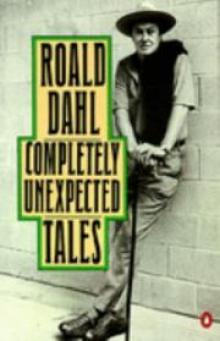 Completely Unexpected Tales: Tales of the Unexpected. More Tales of the Unexpected
Completely Unexpected Tales: Tales of the Unexpected. More Tales of the Unexpected The Wonderful Story of Henry Sugar and Six More
The Wonderful Story of Henry Sugar and Six More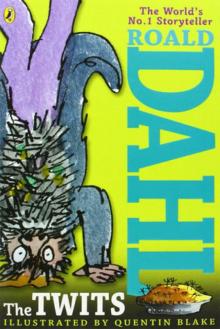 The Twits
The Twits The BFG
The BFG Danny the Champion of the World
Danny the Champion of the World The Witches
The Witches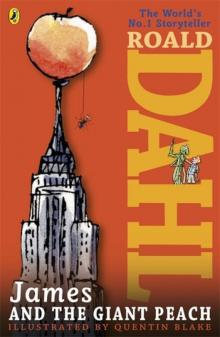 James and the Giant Peach
James and the Giant Peach Charlie and the Great Glass Elevator
Charlie and the Great Glass Elevator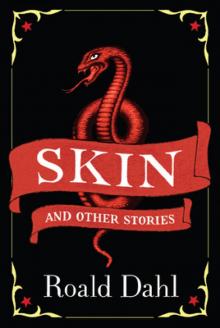 Skin and Other Stories
Skin and Other Stories Kiss Kiss
Kiss Kiss Switch Bitch
Switch Bitch The Giraffe and the Pelly and Me
The Giraffe and the Pelly and Me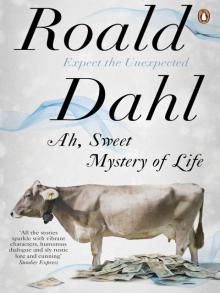 Ah, Sweet Mystery of Life
Ah, Sweet Mystery of Life Fear
Fear The Great Automatic Grammatizator and Other Stories
The Great Automatic Grammatizator and Other Stories Someone Like You
Someone Like You Charlie and the Great Glass Elevator c-2
Charlie and the Great Glass Elevator c-2 More About Boy
More About Boy Tales of the Unexpected
Tales of the Unexpected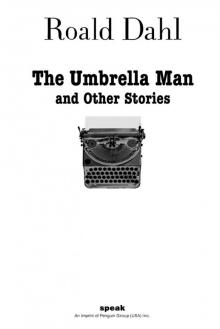 The Umbrella Man and Other Stories
The Umbrella Man and Other Stories Dirty Beasts
Dirty Beasts Roald Dahl's Mischief and Mayhem
Roald Dahl's Mischief and Mayhem The Collected Short Stories of Roald Dahl, Volume 1
The Collected Short Stories of Roald Dahl, Volume 1 The Missing Golden Ticket and Other Splendiferous Secrets
The Missing Golden Ticket and Other Splendiferous Secrets Billy and the Minpins
Billy and the Minpins Over to You
Over to You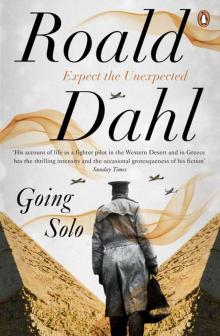 Going Solo
Going Solo Deception
Deception War
War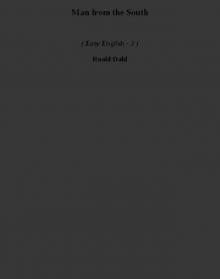 Man from the South ee-3
Man from the South ee-3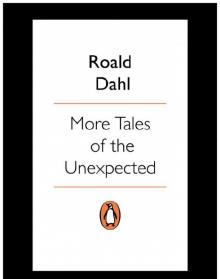 More Tales of the Unexpected
More Tales of the Unexpected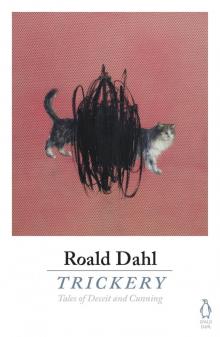 Trickery
Trickery Rhyme Stew
Rhyme Stew Charlie and the Chocolate Factory (Puffin Modern Classics relaunch)
Charlie and the Chocolate Factory (Puffin Modern Classics relaunch) D is for Dahl
D is for Dahl Roald Dahl Whoppsy-Whiffling Joke Book
Roald Dahl Whoppsy-Whiffling Joke Book Spotty Powder and other Splendiferous Secrets
Spotty Powder and other Splendiferous Secrets Charlie and the Chocolate Factory c-1
Charlie and the Chocolate Factory c-1 Boy
Boy Completely Unexpected Tales
Completely Unexpected Tales Madness
Madness Innocence
Innocence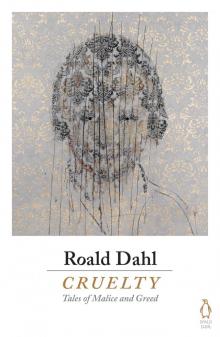 Cruelty
Cruelty George's Marvellous Medicine
George's Marvellous Medicine